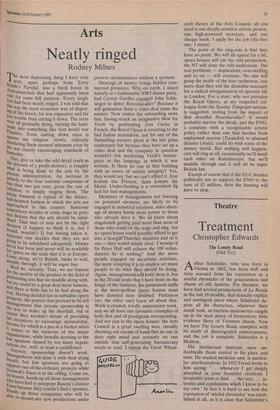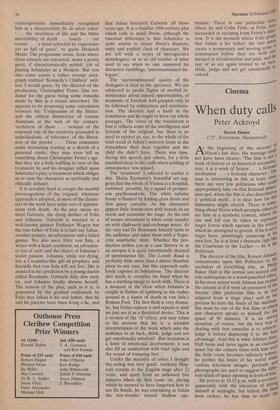Theatre
Treatment
Christopher Edwards
The Lonely Road (Old Vic) AA rthur Schnitzler, who was born in ..Vienna in 1862, has been well and truly rescued from his reputation as a wistful chronicler of the graciousness and charm of old Austria. For instance, we have had several productions of La Ronde in the last 18 months, that sexually explicit and astringent piece where Schnitzler de- picts all his characters, whatever their social rank, as faceless marionettes caught up in the mad dance of fornication; little evidence there of Viennese charm. Now we have The Lonely Road, complete with its study of disintegrated consciousness, and the job is complete. Schnitzler is a Modern.
His intellectual interests were un- doubtedly those central to his place and time. He studied medicine and, in particu- lar, psychoanalysis. In 1922 Freud wrote to him saying: `. . whenever I get deeply absorbed in your beautiful creations I invariably seem to find. . . the very. . . in- terests and conclusions which I know to be my own.' In fact it is hard to see how the reputation of 'wistful chronicler' was estab- lished at all, as it is clear that Schnitzler's contemporaries immediately recognised him as a characteristic fin de siecle voice: `. . . the sweetness of life and the bitter inevitability of death . . . lonely . . . yet serene . . . a mind schooled by experience yet so full of grace', to quote Heinrich Mann. The programme notes, from where these extracts are extracted, make a pretty good, if characteristically potted, job of placing Schnitzler as a Modern. But you also come across a rather strange para- graph entitled 'Kennedy's Children' writ- ten, I would guess, by the director of the production, Christopher Fettes (the evi- dence for the guess being some remarks made by him in a recent interview). He appears to be proposing some correlation between the 'Utopianism of the Sixties' and the ethical discoveries of various Austrians at the turn of the century: `architects of those . . . notions of the essential role of the creativity grounded in individualism, of tolerance, of the libera- tion of the psyche , . .' These comments make interesting reading as a sketch of a personal credo; they may even tell us something about Christopher Fettes's age. But they are a little baffling in view of the treatment he and his designer inflict upon Schnitzler's play, a treatment which obliges us to view the characters as spiritually and ethically defunct.
It is certainly hard to escape the morbid preoccupations of the original, whatever approach is adopted, as most of the charac- ters in the work have some sort of appoint- ment with death. As the play opens we meet Gabriele, the dying mother of Felix and Johanna. Gabriele is married to a well-known painter Professor Wegrat but the true father of Felix is in fact one Julian, another painter, an adventurer and a failed genius. We also meet Herr von Sala, a writer with a heart condition, an adventur- er too of sorts and the object of Johanna's secret passion. Johanna, while not dying, has a Cassandra-like gift of prophecy and foretells that von Sala will not live. She is assisted in her prediction by a young doctor called Reumann. Gabriele duly dies early on, and Johanna finally drowns herself. The tension of the play, such as it is, is generated by the gradual realisation by Felix that Julian is his real father, that he and his parents have been living a lie, and that Julian betrayed Gabriele all those years ago. It is a familiar 19th-century plot which calls to mind Ibsen, although the essential difference is that Schnitzler is quite unable to create Ibsen's thematic unity and explicit clash of character. We are left with a series of introspective monologues, or as an old teacher of mine used to say when no one answered his discursive ramblings, 'unconsummated dia- logues'.
The 'unconsummated' quality of the dialogues is fatal to the spectator. We are subjected to prolix flights of morbid re- miniscence about missed opportunities, of moments of freedom half-grasped only to be followed by solitariness and recrimina- tion. The director had a hand in the translation and he ought to have cut whole passages. The virtue of the translation is that it reflects some of the intelligence and lyricism of the original, but there is no need to subject us, say, to the whole of the total recall of Julian's mistress Irene as she remembers their days together and the child she didn't have. There was time, during this speech and others, for a little snatched sleep in the stalls when nothing of consequence was missed.
The 'treatment' I referred to earlier is this. Maria Bjornson's beautiful set sug- gests that the whole of Vienna is a hospital, endowed, possibly, by a squad of prosper- ous psychoanalysts. The white tubular frame is flanked by folding glass doors and thin gauzy curtains. As the characters appear little Jewish men with beards sit on stools and scrutinise the stage. At the end of scenes attendants in white coats wander on with clipboards and exchange notes. At the very end Dr Reumann himself turns to the audience and rakes them with a 'hypo- crite semblable' stare. Whether the pro- duction strikes you as a case history or as an autopsy it is quite intentionally drained of spontaneous life. The Lonely Road is probably little more than a minor chamber piece in any case, but this approach ruth- lessly exposes its limitations. The director also tends to overplay his hand when he has a startling image to work with. There is a moment at the close when Johanna 'is caught in flashes of lightning as she rushes around in a dance of death in von Sela's Roman Pool. The first flash is very drama- tic, but Fettes repeats it and repeats it until we just see it as a theatrical device. This is a version of the 'A' effect, and may relate to his account that his is 'a socialist interpretation of the work which asks the audience to sit back, think, judge and not get emotionally involved'. But boredom is a form of emotional involvement; it can also fill an auditorium with loud sighs and the sound of tramping feet.
Unlike the majority of critics I thought the acting was very good. Anthony Hop- kins returns to the English stage after 12 years, and apart from an awkward five minutes when he first came on, during which he seemed to have forgotten how to use his hands, he was convincing as Julian the boy-wonder turned shallow ego- maniac. There is one particular scene where he and Colin Firth, as Felix, have succeeded in escaping from Fettes's &;c. tion. It is the moment where Felix grasps that Julian is his father; the two actors create a momentary and moving sense of communion before they are both sub- merged in recrimination and pain, and the rest of us are again invited to sit back' think, judge and not get emotionally 'h. volved.















































 Previous page
Previous page